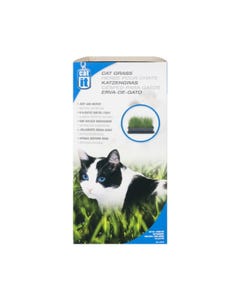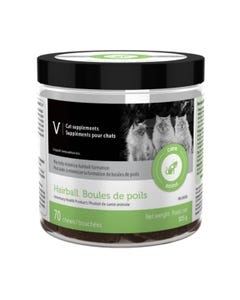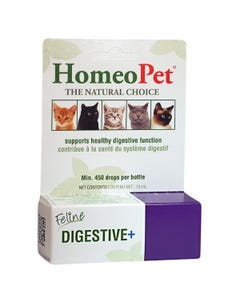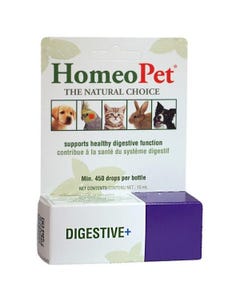Cat Hairball Remedies FAQs
What are hairballs, and why do cats get them?
Hairballs are a common problem in cats and occur when they groom themselves and swallow loose fur, which accumulates in their stomachs. Cats have barbs on their tongues that catch and pull loose hair as they groom, leading to the swallowing of fur.
How do I know if my cat has hairballs?
Some signs that your cat may have hairballs include vomiting, gagging, retching, coughing, and a lack of appetite. You may also notice that your cat is constipated or has trouble passing stools.
Can hairballs be harmful to my cat's health?
While hairballs are usually harmless, they can sometimes cause blockages in the digestive tract, which can be dangerous if left untreated. Frequent hairballs can be a sign of and underlying health issues, such as gastrointestinal problems, so it's important to monitor your cat's hairball frequency and seek veterinary care if needed.
How can I prevent my cat from getting hairballs?
Regular grooming can help prevent hairballs by removing loose fur before your cat can swallow it. Feeding your cat a high-fibre diet or adding a hairball remedy to their food can also help prevent hairballs by aiding in the passage of hair through the digestive tract.
What are some hairball remedies for cats?
There are several hairball remedies for cats, including specialized diets, hairball treats, and supplements that promote healthy digestion and hair passage. Some products contain lubricants, such as mineral oil or petrolatum, that help the hair pass through the digestive tract more easily.
When should I see a veterinarian about my cat's hairballs?
If your cat is experiencing frequent hairballs or if they are exhibiting any signs of distress, it's important to seek veterinary care.
Prevent and Treat Hairballs
One of the easiest things you can do to prevent hairballs in your cat is to brush them more often. Skin and coat care is an important aspect of every cat’s overall health. Less loose hair means they will be ingesting less, which is a simple form of hairball control. If your cat tends to have issues with hairballs on a regular basis, digestive aids and fiber are a good option for you.
Soft treats like the Pet Naturals Hairball Cat Chews help reduce shedding and promote a healthy GI tract, two factors sure to decrease the number of hairballs your cat struggles with.
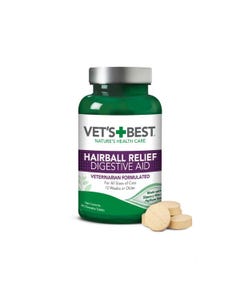 Vet's Best Hairball Relief Tablets for CatsList Price: $16.49 Our Price: $13.49 You Save: $3.00 (18%)AutoShip
Vet's Best Hairball Relief Tablets for CatsList Price: $16.49 Our Price: $13.49 You Save: $3.00 (18%)AutoShip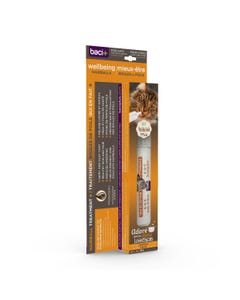 Baci+ Hairball Treatment 3-6-9 For CatsList Price: $26.99 Our Price: $24.99 You Save: $2.00 (7%)AutoShip
Baci+ Hairball Treatment 3-6-9 For CatsList Price: $26.99 Our Price: $24.99 You Save: $2.00 (7%)AutoShip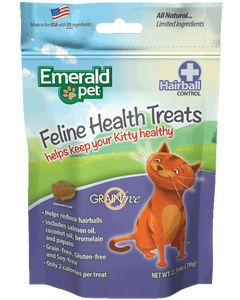
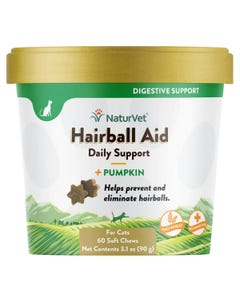 NaturVet Hairball Aid Soft Chew SupplementList Price: $14.49 Our Price: $13.99 You Save: $0.50 (3%)AutoShip
NaturVet Hairball Aid Soft Chew SupplementList Price: $14.49 Our Price: $13.99 You Save: $0.50 (3%)AutoShip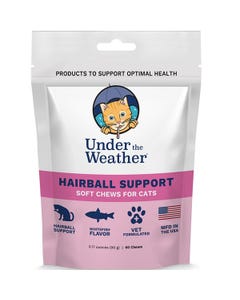 Under the Weather Hairball Support Soft Chews for CatsList Price: $25.99 Our Price: $19.99 You Save: $6.00 (23%)AutoShip
Under the Weather Hairball Support Soft Chews for CatsList Price: $25.99 Our Price: $19.99 You Save: $6.00 (23%)AutoShip
